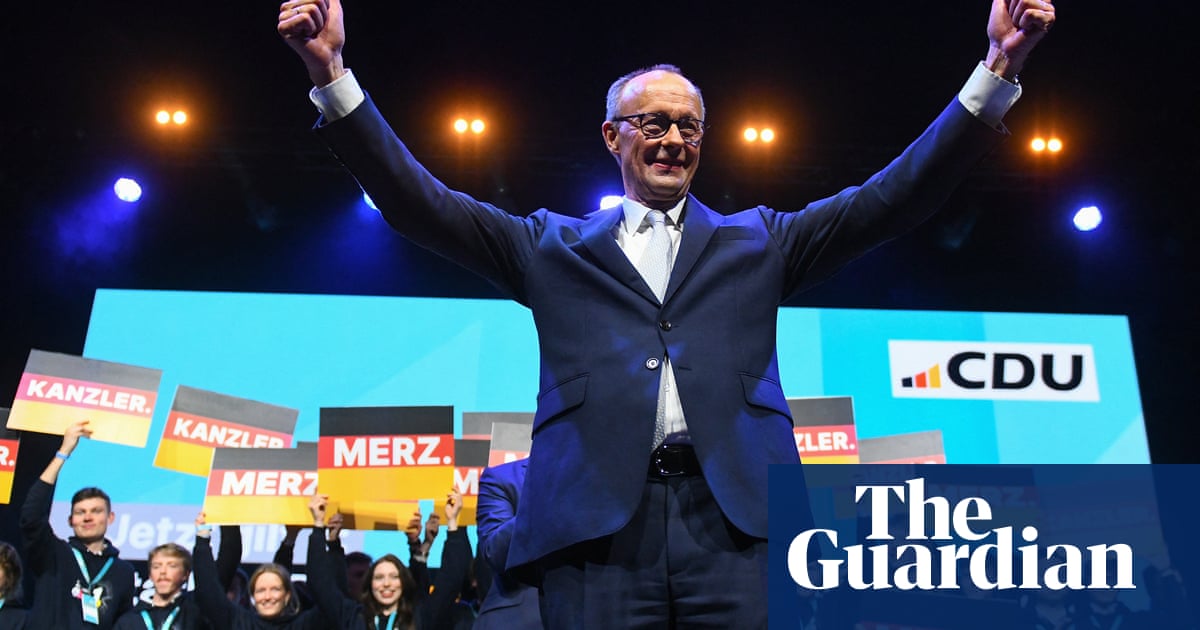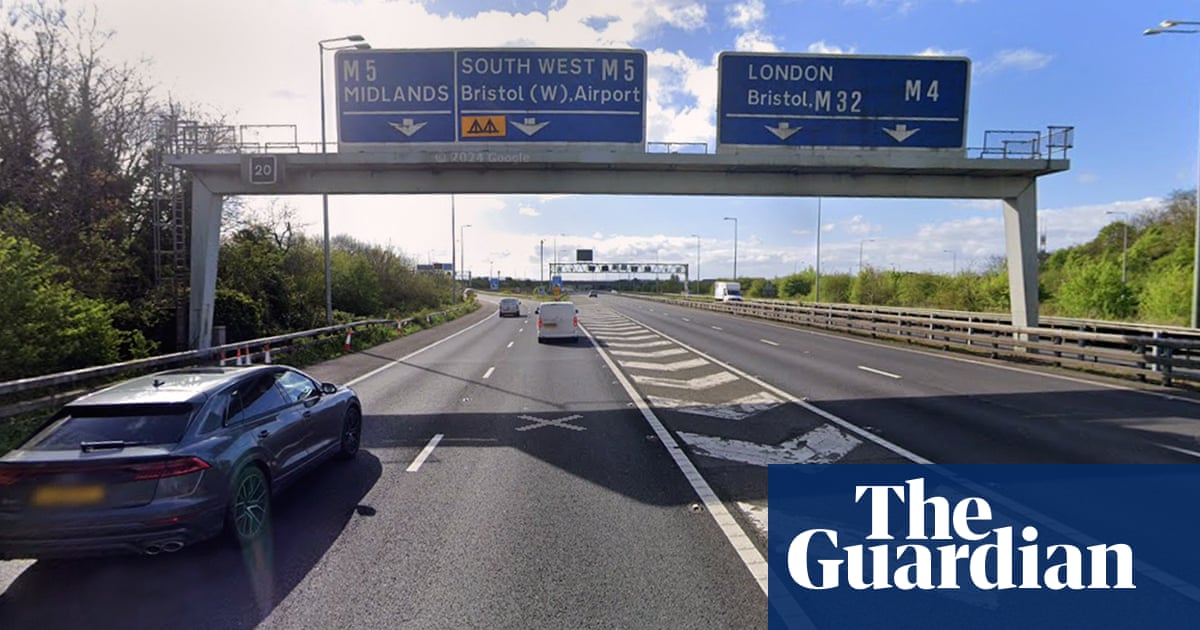Friedrich Merz, a former banker who has never been a government minister, appears almost certain to be the next chancellor of Germany after his conservative CDU/CSU alliance won the most votes in Sunday’s crucial federal election.
During the campaign his decision to win a vote in parliament by relying on far-right support proved a historic and highly controversial turning point, even if he has since insisted he would never break Germany’s “firewall” (“brandmauer”) by going into coalition government with the anti-immigration Alternative für Deutschland.
As testing as the domestic political – and economic – landscape is, however, many of Merz’s most pressing challenges may well come from outside Germany. The man who once won plaudits by claiming he could simplify the life of millions of people by reducing tax rules so they would fit on the back of a beer coaster faces an altogether more complex reality.
Merz, a keen aviator and married father of three, whose wife prevented him from buying his own private jet until his children were out of the house (he now reportedly owns two), will want to make his mark early on. Here’s a brief look at his in-tray.
Relations with the US
Having presented himself early on in the election campaign as an assertive businessman who would be well equipped to make face-to-face deals with the mercantile Donald Trump, Merz was forced to switch his stance within a matter of hours after the US president flipped the narrative on Russia’s war of aggression on Ukraine.
The once optimistic transatlanticist received his first dose of realpolitik even before winning the top job. It seemed to turn him into an ashen-faced, furrow-browed realist, and his rhetoric quickly changed.
Merz did nothing to hide his shock after Trump’s statements blaming Ukraine for the war. Merz called it “a classic reversal of the perpetrator-victim narrative”.
“That’s how Putin has been presenting it for years, and I’m honestly somewhat shocked that Donald Trump has now obviously made it his own,” he said, referring to Trump as “an admirer of autocratic systems”.
To get mired in emotion, however, he said, would not get Europe anywhere. “The only thing we can do if we have a different idea of … democracy … [is] to get our act together in Europe as quickly as possible.”
Yet the challenge is huge. The overnight breakdown in relations between Washington and Berlin, referred to by Merz in no uncertain terms as an “epochal severance”, is likely to become the defining element of his chancellorship.
It will surely dominate what was an already overloaded in-tray. As leader of Europe’s largest economy, his handling of the crisis will be crucial to how the continent stands up to a new world order.
It’s the economy, Dummkopf
Europe’s largest economy is in need of a reboot. Challenges abound, from overregulation and creaking infrastructure to high energy costs, a chronic skills shortage and an ageing population. There is, say many Germans, an urgent need for investment in everything from the country’s defence to its infrastructure.
But doing that is likely to require Merz to relax a constitutionally protected rule known as the “debt brake”, which for years has been used by Berlin to claim its much-vaunted status as a paragon of fiscal discipline.
Under the brake – introduced in 2009 by Angela Merkel to show Germany was committed to balancing the books after the banking crash – the federal government is required to limit annual borrowing to 0.35% of GDP.
Merz could relax that and in turn unleash much-needed funds for investments on everything from housing to rail infrastructure, which more than half of Germans support. But it would not be without controversy: indeed, it was a row over the “debt brake” that ultimately brought down Olaf Scholz’s government. Watch this space.
Ukraine
Ukraine is already a big bone of contention in Germany. There is a clear divide in the population between those who believe supporting Kyiv brings the threat of war closer to Germany – a claim most forcefully made by the “left-conservative” Sahra Wagenknecht movement (BSW) – and those who believe that not supporting it, and showing weakness in the face of Vladimir Putin, is even more perilous.
Merz clearly belongs in the second camp. He warned Scholz against adopting “an appeasement policy” towards Russia, and visited Kyiv even before the then chancellor.
Germany is the second-biggest provider of military supplies to Ukraine, and Merz has fervently backed this, saying he would like to go even further by providing Ukraine with long-range Taurus cruise missiles. He is also likely to face calls to send German troops to Ukraine as part of a deterrent or peacekeeping force, a discussion Scholz has described as “completely premature”.
The German far right
The question of who Merz will seek to go into coalition with, and whether he will continue to rule out forming a government with the far-right AfD, is uppermost in the minds of the electorate.
Merz’s decision in January to signal a taboo-breaking receptivity to AfD backing for a non-binding “five-point plan” on tighter border controls was an explosive turning point in what had been a somewhat staid election campaign.
He has since repeatedly insisted a CDU-AfD coalition is not on the cards.
But many fear that an unstable, fractious coalition government – either a “grand coalition” with Scholz’s Social Democrats (SPD) or an unwieldy threesome of the CDU, SPD and another party – will lead to a repeat of the stalemate and conflict that defined the ill-fated “traffic light” administration.
And the fear is that that could inadvertently pave the way for a CDU-AfD coalition under a new, less reluctant leader at the next likely poll in 2029.
Dealing with Merkel
Merz was sidelined by the former chancellor when he tried to break into the top echelons of the CDU in the early 2000s and the two have never been on the best of terms.
He is hailed by his supporters as a “back to the roots” candidate, a textbook Christian Democrat in the way Merkel never was. He has made his feelings clear about her 16 years at the helm, referring to her leadership as “idle” and claiming a “blanket of fog” lay over her “open door” policy to refugees in 2015.
In her memoirs released last year, Merkel said she “did not begrudge” her old rival the position of chancellor, saying she recognised in him the “unconditional desire to have power” that was necessary to take on the role.
But then, in January, came a rare public rebuke, as the former chancellor criticised Merz’s flirtation with the AfD. Merkel still commands a lot of respect among many Germans so her assessment of his future leadership will be worth keeping an eye on.
Article by:Source: Kate Connolly in Berlin











